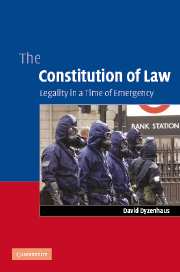Introduction
Published online by Cambridge University Press: 10 December 2009
Summary
Is the rule of law optional for liberal democratic societies? In the wake of the attacks on the United States on 11 September 2001, the Bush administration seemed to say that it is. And in the wake of the attacks on London in July of 2005, Tony Blair has indicated that the rule of law is a luxury, dispensable when the going gets rough. In particular, he has indicated that judges have to be reined in from their disposition to enforce the rule of law against the executive, even if this requires both legislating how they are to balance liberty against security and amending the Human Rights Act 1998. In contrast, the Spanish government elected in the immediate aftermath of the attacks on Madrid on 11 March 2004 did not see fit to renege on a commitment to the rule of law.
Blair's comments fit within a trend whereby many liberal democracies since 9/11 have used either legislation or executive order to create a variety of legal black holes, situations in which individuals suspected of being threats to national security are detained indefinitely. In the United Kingdom, they were detained because, while they were aliens who would ordinarily be deported after a determination that they threatened security, the government is committed to not deporting anyone to a country where that person faces a serious risk of torture.
- Type
- Chapter
- Information
- The Constitution of LawLegality in a Time of Emergency, pp. 1 - 16Publisher: Cambridge University PressPrint publication year: 2006



